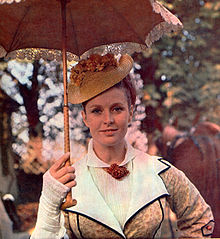The Doll (1968 film)
| The Doll | |
|---|---|
 Beata Tyszkiewicz in The Doll, 1968 | |
| Directed by | Wojciech Has |
| Written by | Wojciech Has |
| Based on | The Doll by Bolesław Prus |
| Starring | Beata Tyszkiewicz Mariusz Dmochowski Tadeusz Fijewski |
| Cinematography | Stefan Matyjaszkiewicz |
| Edited by | Zofia Dwornik |
| Music by | Wojciech Kilar |
Production company | Wytwórnia Filmów Fabularnych (Łódź) |
Release date |
|
Running time | 151 mins. |
| Country | Poland |
| Language | Polish |
The Doll (
The film is an adaptation of the novel The Doll by Bolesław Prus,[1] which is regarded by many as one of the finest Polish novels ever written. The influence of Émile Zola is evident, and some have compared the novel to Madame Bovary by Gustave Flaubert; both were Prus's contemporaries. The movie, however, may be more compared to Stendhal's The Red and the Black.[citation needed]
The Doll constitutes a panorama of life in
This poetic love story follows a nouveau riche merchant, Stanislaw Wokulski, through a series of trials and tribulations occasioned by his obsessive passion for an aristocratic beauty, Izabela Lecka (played by Beata Tyszkiewicz).[citation needed]
Plot
As a descendant of an impoverished Polish noble family, young Wokulski is forced to work as a waiter at Hopfer's, a
Cast
- Mariusz Dmochowski - Stanisław Wokulski
- Beata Tyszkiewicz - Izabela Łęcka
- Tadeusz Fijewski - Ignacy Rzecki
- Halina Gallowa - Zasławska
- Wiesław Gołas - Krzeszowski
- Kalina Jędrusik - Wąsowska
- Jan Koecher - Prince
- Jan Kreczmar - Tomasz Łęcki
- Tadeusz Kondrat - Szlangbaum
- Halina Kwiatkowska - Krzeszowska
- Andrzej Łapicki - Kazimierz Starski
- Jan Machulski - Julian Ochocki
- Józef Pieracki - Doctor Szuman
- Janina Romanówna - Countess Joanna
Reception
Time Out calls the film "A handsomely mounted Polish marathon".[2]
References
- ^ The Doll, retrieved 2023-07-28
- ^ DP (2012-09-10). "The Doll". Time Out Worldwide. Retrieved 2023-07-28.
External links
- The Doll at IMDb
